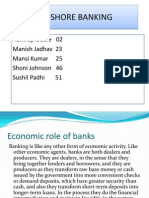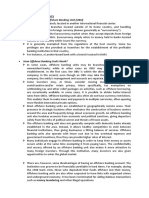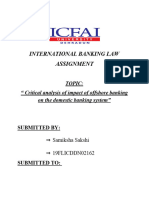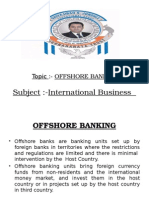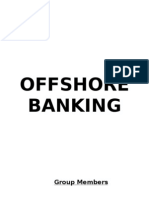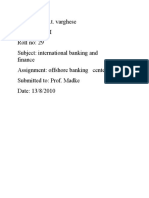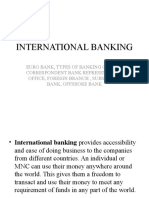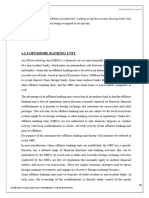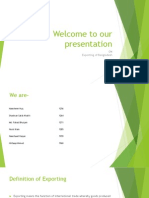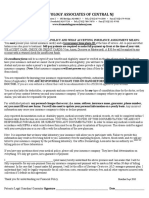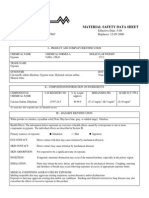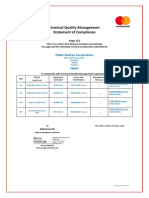Off-Shore Banking Definition
Off-Shore means out of the shore or located or
based outside of ones national boundaries.
Off-shore Banking Unit is a separate part or
unit of a Bank whether incorporated in
Bangladesh or outside Bangladesh involving
foreign currency denominated assets and
liabilities that are out of proportion to the
current account transactions of their domestic
business and shall maintain its own separate
books of accounts.
�Off-Shore Banking Characteristics
The OBU shall maintain its own separate
accounts relating to off-shore banking
business.
The operations of OBU shall be subject to the
relevant laws of Bangladesh except those in
respect of which exemptions are provided.
There will be no statutory capital and reserve
or liquidity requirement for an OBU.
�Off-Shore Banking Characteristics
The OBUs shall carry on transactions in freely
convertible foreign currencies.
There would not be any restriction on the
physical location of the OBU. These may be
located both in the EPZ or any other
convenient location outside. Even existing
branches of Bank may be allowed to operate
such units through a completely separate
counter.
�Off-Shore Banking - Operation and
Activities
Deposit/borrow in Foreign Currency:
The OBU will be free to accept deposit
from or to borrow from:
persons / institutions not resident in
Bangladesh
Bangladesh nationals working abroad.
Type-A (wholly foreign owned) units in
the Export Processing Zones in
Bangladesh
�Off-Shore Banking
Operation and
Activities
The OBU shall not accept deposits from
persons/institutions resident in
Bangladesh including Type-B (Joint
Venture) and Type-C (wholly local owned)
units in the Export Processing Zones in
Bangladesh.
�Off-Shore Banking
Operation and
Activities
Lending in Foreign Currency:
persons / institutions not resident in
Bangladesh.
Type-A (wholly foreign owned) units in
the Export Processing Zones in
Bangladesh.
�Off-Shore Banking
Operation and
Activities
Banking transactions
Banking transactions with residents of
Bangladesh outside EPZ will not be
permissible.
There would be no restriction on
banking transactions with non residents.
�Off-Shore Banking
Operation and
Activities
Maintaining Other Bank account in
foreign Currency
Local banks may also maintain foreign
currency accounts with OBUs like they
maintain Nostro accounts with their
foreign correspondence.
�Off-Shore Banking -
Products
or services
Products or services:
All type of Deposit/Borrowing/Lending
with
non-resident
individual
or
company.
All type of foreign trade services.
�Off-Shore Banking -
Products
or services
Off-shore financing through UPAS
(Usance Payment at Sight). OBUs may
discount/purchase import bills accepted
by ADs in Bangladesh.
Lending or Placement to ADs for Export
Bill Purchasing/Discounting in Foreign
Currency.
�Off-Shore Banking
Source of Fund
Sources of Fund:
Internal Source:
Deposit
collection from non-resident/
A-Type Company.
Borrowing
from Head Office.
�Off-Shore Banking
Source of Fund
External Source:
Credit line with overseas bank
/corresponding bank
Term borrowing from overseas bank or
International Financial Institution or
Inter Bank.
�International Factoring
International factoring is as an arrangement
between an exporter and a factor whereby
the factor purchases the trade debts from
the exporter and provides the services
such as finance, maintainance of sales
ledger, collection of debts, protection
against credit risks etc.
�International Factoring
1st Stage: The exporter signs a factoring
agreement assigning all trade receivables to an
export factor.
2nd Stage: The Export factor chooses an FCI
(factor Chain International) correspondent to
serve as an import factor in the country where
goods are to be shipped.The receivables are then
reassigned to the import factor.
3rd Stage: At the same time, the import factor
investigates the credit standing of the buyer of the
exporters goods and establishes lines of
credit.This allows the buyer to place an order on
open account terms without opening letter of
credit.
�International Factoring
4th Stage: the exporter factor will now advance
upto 80% of the invoice value to the exporter.
5th Stage:Once the sale has taken place,the
import factor collects the full invoice value and is
responsible for the swift transmission of funds to
the export factor who then pays the outstanding
balance to the exporter.
�THANK YOU




